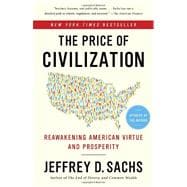
Note: Supplemental materials are not guaranteed with Rental or Used book purchases.
Purchase Benefits
What is included with this book?
| Preface to the Paperback Edition | p. xi |
| The Great Crash | |
| Diagnosing America's Economic Crisis | p. 3 |
| Prosperity Lost | p. 11 |
| The Free-Market Fallacy | p. 27 |
| Washington's Retreat from Public Purpose | p. 47 |
| The Divided Nation | p. 67 |
| The New Globalization | p. 85 |
| The Rigged Game | p. 105 |
| The Distracted Society | p. 133 |
| The Path to Prosperity | |
| The Mindful Society | p. 161 |
| Prosperity Regained | p. 185 |
| Paying for Civilization | p. 209 |
| The Seven Habits of Highly Effective Government | p. 237 |
| The Millennial Renewal | p. 251 |
| Acknowledgments | p. 265 |
| Further Readings | p. 269 |
| Notes | p. 277 |
| Works Cited | p. 297 |
| Index | p. 309 |
| Table of Contents provided by Ingram. All Rights Reserved. |
The New copy of this book will include any supplemental materials advertised. Please check the title of the book to determine if it should include any access cards, study guides, lab manuals, CDs, etc.
The Used, Rental and eBook copies of this book are not guaranteed to include any supplemental materials. Typically, only the book itself is included. This is true even if the title states it includes any access cards, study guides, lab manuals, CDs, etc.